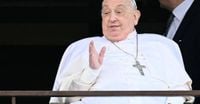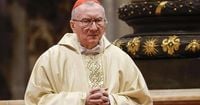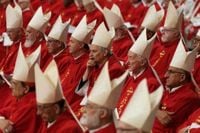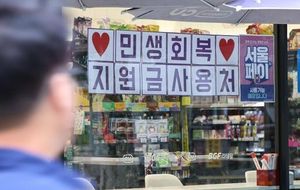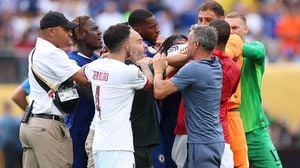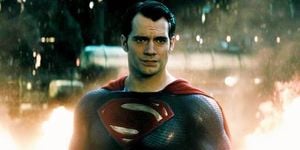As the Catholic Church prepares for a significant transition, the American betting house Polymarket has identified Italian Cardinal Pietro Parolin as the frontrunner to succeed Pope Francis. With the conclave set to commence on May 7, 2025, Parolin, who currently serves as the Vatican Secretary of State, is seen as a pivotal figure in the selection process.
At 70 years old, Parolin is not only the first cardinal appointed by Pope Francis but also a seasoned diplomat known for his ability to navigate complex ecclesiastical politics. According to Polymarket's latest projections, he holds a 27% chance of becoming the next pope, making him the most favored candidate in the upcoming conclave.
Following closely behind him is Cardinal Luis Antonio Tagle from the Philippines, who has a 21% chance of ascending to the papacy. Tagle, aged 67, leads the Vatican's evangelization efforts and is considered more aligned with the progressive ideals of Pope Francis. Other contenders include Ghana's Cardinal Peter Turkson with a 16% chance and Italian Cardinal Matteo Zuppi at 13%.
The upcoming conclave is not just a routine election; it represents a critical juncture for the Catholic Church, which is grappling with various internal and external challenges. The election will take place in the Sistine Chapel, where 133 cardinal electors will gather to deliberate and ultimately choose the new pope. This conclave is particularly noteworthy as it follows the tenure of Pope Francis, who has led the Church since 2013 and has made significant strides towards reforming its image and practices.
While betting on papal elections may seem unusual, it has a long history. The practice dates back to the 15th century, with records indicating that even life insurance policies for popes were used as speculative ventures. In fact, the first documented instance of betting on a papal election occurred during the conclave of 1503, which elected Pope Leo X.
Despite the controversial nature of betting on such a sacred event, it reflects the intense interest and speculation surrounding the future leadership of the Catholic Church. The dynamics at play in this conclave are particularly complex, as many cardinals have differing views on the direction the Church should take.
Parolin's candidacy is seen as a potential bridge between the conservative and progressive factions within the Church. He has been noted for his criticisms of some of Pope Francis's decisions, including the blessing of same-sex couples, which positions him as a candidate who could appeal to both sides of the ideological spectrum.
In contrast, Tagle, often referred to as the "Asian Francis" due to his similar pastoral approach, is viewed as a more liberal choice. His commitment to social justice issues and advocacy for the marginalized aligns closely with the values promoted by Pope Francis. Tagle's previous role as the head of Caritas Internationalis further underscores his dedication to humanitarian causes.
As the cardinals prepare for the conclave, discussions have already begun regarding the qualities needed in the next pope. Many believe that the new leader must be someone who can unify the Church and address the pressing issues it faces, including declining membership and ongoing scandals related to abuse within the clergy.
Interestingly, the conclave's proceedings are shrouded in secrecy, and there are no public opinion polls to gauge the sentiments of the cardinals, making the outcome unpredictable. As noted by medievalist Rebecca Rist from the University of Reading, "There is a saying that 'He who enters the conclave as pope, leaves as a cardinal.'" This highlights the often unpredictable nature of papal elections.
In addition to Parolin and Tagle, other names being discussed include Cardinal Fridolin Ambongo from the Democratic Republic of Congo, who has been a vocal advocate for peace in his homeland, and Cardinal Péter Erdő from Hungary, known for his conservative theological stance.
With the conclave just days away, the anticipation is palpable. Many are watching closely as the cardinals arrive at the Vatican, each bringing their own perspectives and agendas to the discussions. The outcome of this conclave could have lasting implications for the Catholic Church and its followers worldwide.
As betting continues in places where it is permitted, the odds reflect the shifting tides within the Church. In Brazil, for instance, betting on the papal election is prohibited, but international markets are buzzing with speculation. Parolin leads the betting odds, followed by Tagle and Turkson, with odds indicating a competitive race.
Ultimately, the next pope will inherit a Church at a crossroads, facing challenges that require both spiritual leadership and pragmatic governance. As the cardinals prepare to cast their votes, the world watches to see who will emerge as the next leader of one of the oldest institutions in the world.
